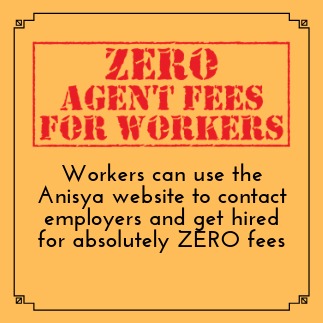Recognising the contributions of foreign workers in Singapore
Today is International Migrants Day. As we mark this day, we should pause to recognise the contributions of migrant workers in Singapore – whether they are construction workers who help build the infrastructure we enjoy and the homes we live in, whether they are service or professional staff, or foreign domestic workers who help to care for our children and parents while we are at work. They have each left their homes and families behind to seek better opportunities here, not unlike our forefathers who had come here many years ago. We are grateful for all their contributions and I would like to say thank you for their hard work and for helping to sustain our way of life.

An FDW with her young charge
While the vast majority of foreign workers polled in a 2011 Migrant Workers Centre-Ministry of Manpower survey have said they were satisfied working in Singapore – with 8 in 10 of them wanting to extend their contract when it expires, here at the Ministry of Manpower (MOM), we continually strive to make things better, not only for our own Singaporean workforce, but also for our migrant workforce working here.
With foreigners making up 1 in 3 of the overall workforce, there will inevitably be employment disagreements or disputes between foreign workers and their employers. The question is how these grievances should be handled. There is no need to take matters into their own hands and break the law. What are these legitimate channels?
Channels to raise employment grievances
Raise the matter formally with your employer and HR. Workers should always raise their grievances with their employers first. If the supervisor is not responsive, raise it formally with the Human Resource department. On the employers’ part, the Singapore National Employers Federation has recently released the Advisory on Employee Grievance Handling. We urge all employers to adhere to the guidelines set out.
Go to unions. Those working in unionised companies should approach the union representatives for advice, or help about their employment grievances.
Approach your embassy. Foreign workers can also contact their respective embassies if their employers fail to address their concerns. The contact numbers of major embassies are listed in the various MOM and non-government organisations (NGOs) outreach materials.
Approach MOM. MOM’s key role is to ensure basic employment standards for all workers. When it is established that statutory employment rights of workers have been infringed upon, we will take firm and decisive action, including meting out penalties to deter errant employers.
Approach NGOs. There are various NGOs here that provide direct services to workers such as Migrant Workers Centre (MWC), Healthserve, Humanitarian Organisation for Migration Economics (HOME), and Transient Workers Count Too (TWC2). These NGOs play a useful bridging role in referring cases to MOM, resolving workers’ grievances and helping to provide accommodation for these workers.
What we have done to make things better for migrant workers
Legislation
Like locals, foreign migrant workers are protected by our employment laws – both the Employment Act and the Employment of Foreign Manpower Act (EFMA). Our legislation is regularly reviewed to ensure continued relevance and efficacy in view of the changing foreign worker landscape. In our current review of the Employment Act, we have invited the public to contribute suggestions and views. Some of the suggestions will be considered in the first phase of the review which is due to be concluded in the first half of next year, while others will be considered in the second and subsequent phases of the review. So please keep those views and feedback coming.
The amended EFMA came into effect very recently on 9 November 2012. Besides making employers pay the true costs of hiring foreigners, it also stems the worst abuses against foreign workers, especially by tackling employment kickbacks and employment scams by shell businesses. We are looking at a second tranche of EFMA changes in 2013, to ensure the well-being of workers as well as an equitable balance of rights and responsibilities between employers and workers. Again, we invite public views and suggestions so that we can take a balanced approach that protects workers while ensuring our economy stays competitive and vibrant.
Also, recognising the crucial intermediary role of employment agencies, the Employment Agencies Act was amended in April 2011. This has allowed us to further tighten enforcement against unlicensed and errant employment agencies, and raise the professionalism and accountability of industry stakeholders. The amended Act also caps agency fees payable by the worker to a local employment agent at 1 month per year of the duration of the worker’s pass, capped at a maximum of 2 months. Local employment agencies must also refund at least 50% of the fees collected from workers who are prematurely terminated within the first 6 months of employment. However, we do not have jurisdiction over the employment agency fees paid by workers in their home country.
Education
On the education front, MOM works with our partners to safeguard the rights and interests of all workers. For example, we will work closely with the newly formed Dormitory Association of Singapore Ltd, which was incorporated in September this year. This association, which represents more than 70% of the local approved dormitories, aims to promote uniformity and better standards in the industry.
Also, to help guide employers, we have worked over the past year to consolidate a set of standards to clarify basic foreign worker housing standards which we hold employers responsible for. These standards are based on existing requirements from various regulatory agencies. They also clarify expectations which may not be explicit, such as adequate shelter against the elements, the supply of clean water for workers’ basic needs and the prevention of unwarranted intrusions of privacy, to name a few. We intend to disseminate these standards to employers early next year, and eventually require them to be in the EFMA after the industry has had time to take them on board and has given us their feedback. This would help level up the performance of the poorer foreign worker dormitories here. Outreach to migrant workers is an important part of MOM’s work. We hold regular roadshows at worker dormitories and publish regular newsletters to educate workers on their rights. We are also moving upstream in our outreach, having piloted pre-departure briefings for Singapore-bound construction workers in a few source countries last year. The briefings touch on their rights and obligations, our employment laws, the maximum fees that should be paid to our local employment agencies and avenues for assistance.

Acting Minster Tan Chuan-Jin at an MOM-led dormitory inspection in 2012.
Our revamped In-Principle Approval (IPA) letters, sent to workers in their home countries, are written in their native language and include the terms of their employment – declared salary, monthly allowance, deductions and fees paid to employment agencies in Singapore.
MWC is also working with MOM to produce an educational video for migrant workers before they depart for Singapore, so that they can be better informed on their employment rights and how to settle any employment disputes amicably. I hope we will continue to see more of such NGO collaborations in the future.
Enforcement
Thanks to our educational outreach efforts, MOM receives some 7,000 telephone enquiries and 2,500 emails per month on employment-related matters from both local and foreign workers. Some 600 statutory employment claims (e.g. non-payment of salary or overtime pay, unauthorised deductions made from salary etc) are processed every month, which are resolved through conciliation or adjudication by the Labour Court. More than 90% of such cases are settled within 1 month. For non-statutory contractual grievances related to the workplace (e.g. dissatisfaction with employment terms, wages, job scope), workers should raise the matter with the company or their unions who can take up their grievances.
On the housing front, MOM issues warnings, composition fines (which have recently been increased to up to $5,000 per charge with the amended EFMA), or prosecutes employers for housing their foreign workers in unacceptable accommodation. Since 2005 to June this year, MOM has taken enforcement action against 7,660 employers for failing to provide acceptable accommodation for their foreign workers. As a result of MOM’s enforcement actions against these employers, over 50,000 foreign workers were relocated to acceptable accommodation.
We can and will do more for workers
There have been various criticisms directed at our management of migrant worker matters. Indeed, as with all issues, I do believe we can do more. Our various systems, including those dealing with employment issues for workers, can be improved and we will continue to work on them.
Whatever systems in place, there will always be some employers in Singapore who are irresponsible and who do not treat workers fairly. However, most are reasonable employers, so we should not tar all employers with the same brush. In the same vein, there are also workers who are less than responsible, but neither should we generalise this about all workers. There will always be black sheep.
We have reviewed our legislation and will continue to do so, to ensure protection for workers. We are not pro-employer or pro-worker – instead, MOM strives to balance the employer-worker relationship while ensuring vulnerable workers are not disadvantaged.
At the same time, MOM cannot do it alone. The onus is on employers as well – employers who bring in foreign workers must be responsible for them and treat them fairly. They must not simply look at the bottomline without caring for workers’ welfare and well being – this applies for local and migrant workers alike. Irresponsible employers will be taken to task, because it is wrong and it does not reflect the values that we should hold as a society. By taking care of their workers, they would be more productive and committed. Good management matters.
At the end of the day, it is about doing what is right. Singapore’s economy and businesses will continue to tap on foreign workers to supplement specific sectors. These workers, who may not be as familiar with the laws and avenues for help here, are vulnerable. Their rights should and must be protected. In fact, more than 90% of some 3,000 work pass holders surveyed in 2011 were satisfied with working in Singapore. We should certainly keep it that way.
Happy International Migrants Day to all!
Acting Manpower Minister
Tan Chuan-Jin
Source: http://momsingapore.blogspot.sg/2012/12/recognising-contributions-of-foreign.html
View all posts in Anisya Blog
Posted on 18 Dec 2012

Help FDWs avoid debt
Anisya can help with the MOM paperwork

Found a suitable worker on Anisya? We can help with the MOM paperwork. Our service fee is $450. Click here for more info.
Full service hiring available

Need to hire an FDW in a hurry? Let Anisya help you with screening, short-listing and scheduling interviews with workers, and managing all the MOM paperwork formalities! More details here.
Anisya Web Services works in partnership with Anisya LLP (MOM License 12C5866) for MOM related transactions.
Anisya is a proud Social Enterprise member of the Singapore Centre for Social Enterprise (raiSE) and the Business For Good community which promotes the use of business for social impact.
